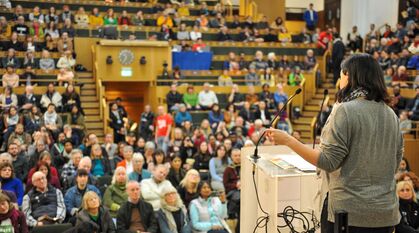We need to reclaim security for everyone
Charlotte Cooper explores how a human security approach can help tackle the biggest challenges we all face and invites people to take part in this growing movement.

As a peace campaigner, it can feel like there is so much we need to resist at the moment: rising military spending, growing risk from nuclear weapons, and increasing public support for military intervention against the backdrop of the Ukraine invasion.
I also feel I can't ignore other defining trends in the world that can't be separated out from peace, such as the climate crisis and deepening economic inequality. In this context, I find the framework offered by Rethinking Security helpful in linking together many different peace and security challenges, whilst also bringing other justice and ecological issues into the picture.
The failures of 'national security'
The work of Rethinking Security – a network of individuals and organisations which includes many Quakers – asks who the current concept of security really works for; 'security' for whom?
The UK's security policy, like that of many wealthy states, uses military force or the threat of force to defend the state's power and economic interests abroad. It also deploys police and border forces to control groups deemed a 'security threat' at home, whether that be people seeking sanctuary, minoritised racial and religious communities, or protestors. In other words, this is security from others, and frequently even at the expense of others.
Not only is this view of 'security' incompatible with the Quaker peace testimony, it also isn't effective even on its own terms: at keeping the UK safe.
In my previous work challenging aspects of UK national security policy that threaten children's human rights, I campaigned for the Government to change its approach to children who travelled to Syria to join ISIS, or were born there to parents who did so. The current approach of stripping these people of their citizenship and refusing them the right to return home is not only a violation of international law and human rights, it also fails even to keep the UK secure. It keeps vulnerable young people in camps with appalling conditions, breeding grievances which help rather than hinder groups like ISIS who use the camps as recruiting grounds.
Towards 'human security'
The Quaker understanding that there is that of God in everyone compels us to challenge this model of security, and invest in one that values the security of all: one of human security. This approach understands that our security cannot be isolated from the security of others; they are interdependent.
The consequences of this are that security policy must ask what the biggest risks to the safety and flourishing of all are, both within the UK and internationally, and tackle them together. Unsurprisingly, most of these risks – such as the climate crisis, nuclear weapons and gross inequality in the division of resources – can only be tackled through cooperation.
In asking what genuine security really looks like – whether that be health, freedom from poverty, or safe and thriving communities – a human security approach also allows us to move beyond resisting the many negatives, and encourages us to imagine the world we want to live in.
The how, not just the what, of security policy
While Rethinking Security has a vision, the network values process – how we get there – as much as outcome. A huge factor in why our current approach to security is so flawed is that it is created by a small group of people through a very closed process. 'Defence' policy is often seen as being too important or sensitive to open to public scrutiny and input from civil society.
Consultations are opened around key defence policy moments – such as the recent 'Integrated Reviews' of security policy – but they are often highly technical and don't invite wide participation. In this context, a small group of arms company executives have a much better chance at influencing defence policy through lobbying and mixing with politicians in the corridors of power than vast swathes of the public do.
The Alternative Security Review
To respond to this, Rethinking Security are creating their strategy a very different way; through the Alternative Security Review. As well as drawing on expert opinion on how we can respond to the genuine, pressing challenges we face, it also invites ordinary people to share what 'security' means to them. To have your say, respond to the public call for evidence by 21 July. It asks just four questions and requires no expert knowledge. The evidence collected through the public call about the security concerns of people across the UK will be incorporated into Rethinking Security's upcoming Human Security Strategy.
In another world, 'security' could mean something positive for all, rather than a tool for division and oppression. But to get there, we need to reclaim the word from the military establishment and start talking about what it means to us.

